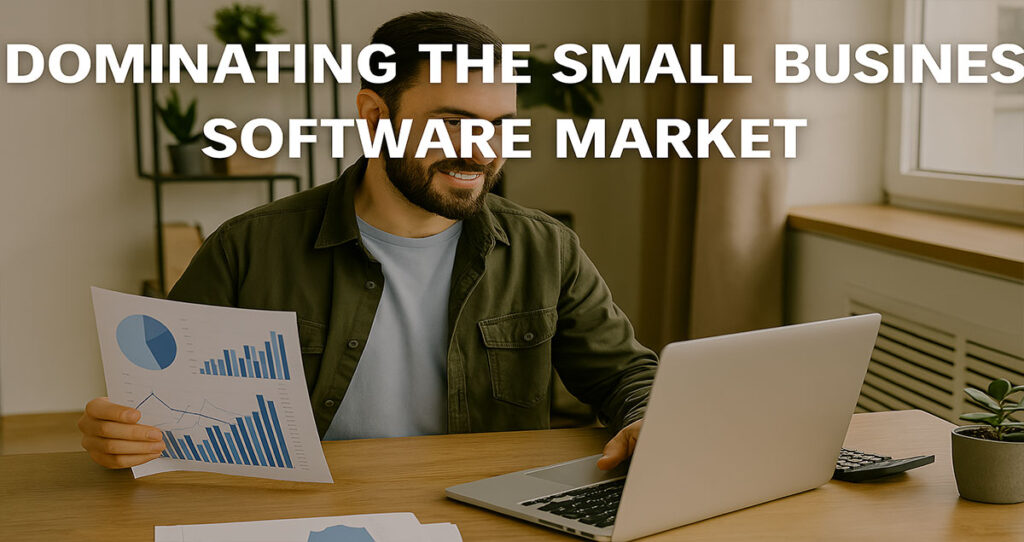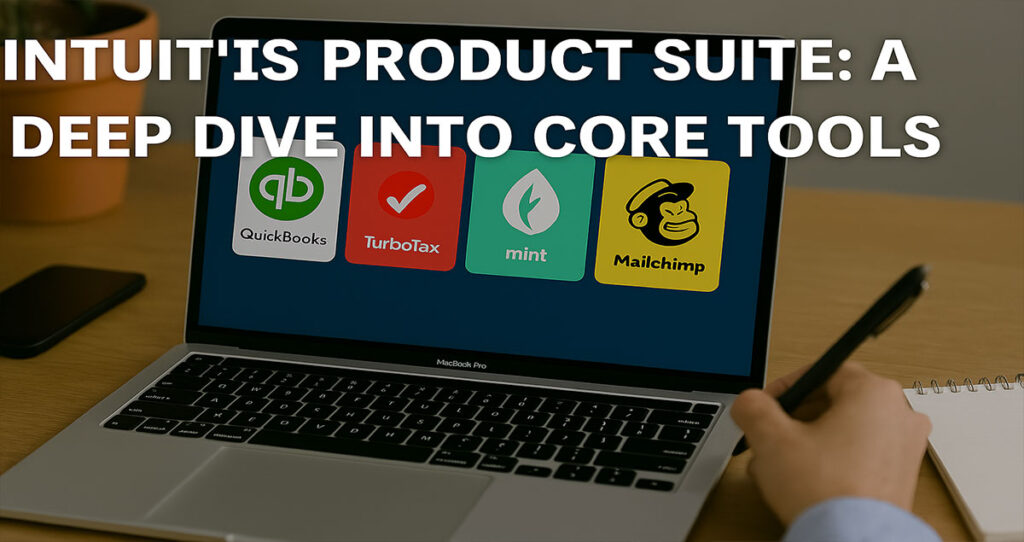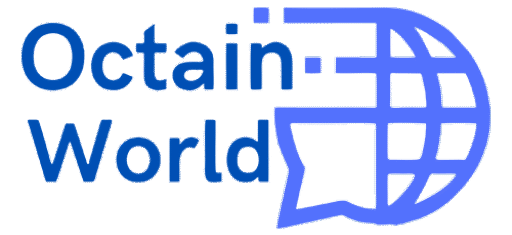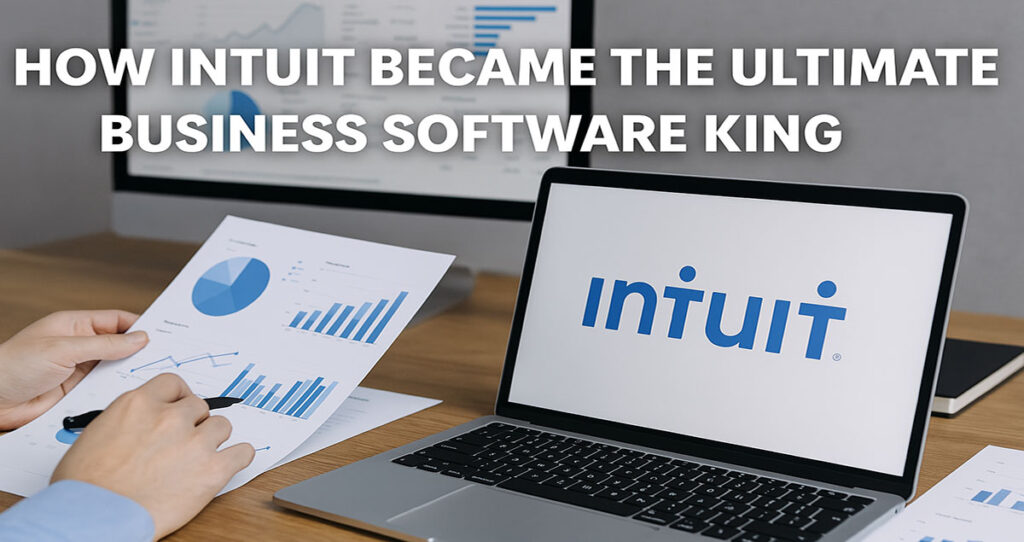Beginning as a small company, Intuit is now a major player in the software industry because it gives both individuals and small companies user-friendly financial tools. QuickBooks, TurboTax, and Credit Karma are flagship products that allow Intuit to control much of the business software sector, using creativity, smart deals, and convenient integration of solutions. By focusing on user experience, sustainability, and latest progress like AI and cloud computing, it has become the clear leader in business software, allowing millions to manage their finances.
The Genesis of Intuit: A Visionary Start
The financial software industry was complicated, and accountants and large companies mainly used it in the early 1980s. Seeing that average people had trouble with their finances, Scott Cook and Tom Proulx decided to found Intuit in 1983 to make financial administration easier. Quicken is what made Quicken revolutionize personal budgeting and expense tracking by making it simple and easy to understand.

It wasn’t just being well-designed that made Quicken popular, but also how much it was meant for users. When software was usually complicated to use, Quicken showed that it was simple to operate for most people. This helped Intuit decide to always put the user first.
Key Takeaways:
- User-Centric Design: Prioritizing simplicity and accessibility.
- Market Gap Identification: Addressing the needs of non-professional users.
- Innovation: Working to make financial software as easy as possible for everyone.
Embracing the Cloud: Transitioning to SaaS
Emerging technologies brought greater expectations for websites from people. Cloud computing, being newly created both challenges and new opportunities in IT. Intuit saw that Software as a Service (SaaS) models could make a big difference and made a move to make its products available via the cloud. Users were now able to get to their financial information from any place at any time, which helped them work and cooperate more freely.
Since moving to SaaS, Intuit could update its software instantly, allowing users to benefit from the newest changes and stay secure. Besides, being subscription-based meant the company had dependable revenue that could go towards upgrading its products all the time.
Benefits of SaaS Transition:
- Accessibility: 24/7 access to financial data across devices.
- Real-Time Updates: Immediate implementation of new features and security patches.
- Scalability: Easier to accommodate growing user bases.
- Predictable Revenue: Steady income through subscriptions.
Strategic Acquisitions: Expanding the Portfolio
Intuit looked to get more involved in the market by purchasing companies that matched its offerings. Notable acquisitions include:
- Mint (2009): An application where all your financial details are displayed.
- Credit Karma (2020): People can get their credit score for free and find advice on financial matters.
- Mailchimp (2021): An email marketing service helped Intuit reach out to a huge number of small businesses.
Due to these acquisitions, Intuit added different tools that help both people and small businesses with financial management.
Impact of Acquisitions:
- Diversification: Broadened service offerings beyond accounting.
- User Base Expansion: Attracted new demographics and markets.
- Integrated Ecosystem: Integrating services so users have a better experience.
Customer-Centric Approach: Listening and Adapting
The success of Intuit comes from always working to help customers with their problems. Various methods are used by the company to learn what users think, such as:

- User Testing: Noticing how real users act with a product to notice pain or difficulty.
- Surveys and Feedback Forms: Requesting user feedback about how satisfied they are and which new features can help.
- Community Forums: Helping users offer support and advice to one another by allowing them to chat.
Applying this cycle in development makes it more likely that users are happy, which creates loyalty and helps win their trust.
Customer Engagement Strategies:
- Proactive Support: Making sure we tell managers about issues early so they can handle them quickly.
- Personalization: Adjusting the experience based on what users like and do.
- Transparency: Always inform staff when there are updates or changes.
Leveraging Artificial Intelligence: Enhancing User Experience
Applying AI has had a major impact on Intuit’s line of products. Automating routine jobs using AI frees users to work on more important activities. For instance:
- Smart Categorization: Automatically classifying transactions to streamline bookkeeping.
- Predictive Insights: Making predictions and giving advice using previous data as a base.
- Chatbots: Helping customers instantly with assistance from AI virtual assistants.
Because of AI, Intuit provides both enhanced efficiency and a more suitable and user-friendly experience for its customers.
Advantages of AI Integration:
- Efficiency: Reduction in manual data entry and errors.
- Insights: Actionable analytics for informed decision-making.
- Support: 24/7 assistance through intelligent chatbots.
Building a Seamless Financial Ecosystem
One key strategy of Intuit is building a unified ecosystem where its major products, including QuickBooks, TurboTax, Credit Karma, Mailchimp, and Mint (before retirement), work hand in hand. All areas related to finances or business operations can be managed in one central space. The result? There are fewer tools to keep track of, workflows are more effortless, and finances are clearer.
For example:
- QuickBooks handles accounting, payroll, and invoicing.
- TurboTax simplifies tax preparation and filing.
- Credit Karma will tell you your credit status and offer personalized product advice.
- Managing marketing campaigns and customer engagement is handled by Mailchimp.
Information and insights from one solution are available in others, which makes it easier for the system and cuts down on repeated data entry. This makes life easier for small business owners because they spend less on spreadsheets and more on making the business grow.
Benefits of the Intuit Ecosystem:
| Feature | User Benefit |
| Unified Login | Access all tools with a single credential |
| Cross-Product Integration | Shared data eliminates duplication |
| Personalized Dashboards | Financial snapshots across all platforms |
| End-to-End Automation | From income to invoicing to taxes |
| Better Decision Making | Holistic financial views with actionable insights |
Apart from being a set of tools, Intuit’s ecosystem is also an operating system for people and businesses dealing with money. It creates stickiness that keeps users loyal and allows Intuit to gather deeper insights for continuous product improvement.
Dominating the Small Business Software Market
While Intuit serves individuals, its strongest growth and deepest influence lie in the small business sector. Many small and medium-sized businesses (SMBs) now rely on QuickBooks because it is the industry standard. It is reported that QuickBooks dominates the accounting market with over 80% of SMB businesses in the United States.

What makes QuickBooks so dominant?
- Ease of Use: Made to be accessible to non-accountants with easy-to-use dashboards and tools.
- Scalable Plans: From freelancers to companies with 50+ employees.
- Customization: Industry-specific templates and modules.
- Automation: Invoice generation, bank syncing, payroll automation.
The software also integrates seamlessly with other Intuit products and with third-party applications via open APIs. This allows users to create bespoke systems that meet their unique needs.
QuickBooks by the Numbers:
| Statistic | Value |
| Market Share (US SMBs) | 80%+ |
| Global Subscribers (2024 est.) | Over 7 million |
| Penetration in 1–20 employee firms | 90%+ |
| Apps Integrated with QuickBooks | Over 700 |
This dominance has a self-reinforcing effect, because so many accountants use and recommend QuickBooks, more small business owners choose it, which in turn strengthens its ecosystem and community support.
Outmaneuvering Microsoft: The Strategic Bundling Masterstroke
One of the most remarkable chapters in Intuit’s history is how it effectively stood up to tech giant Microsoft during the early 1990s. Microsoft launched Microsoft Money as a direct competitor to Quicken, which had already gained significant traction. While most small companies would have withered under such pressure, Intuit fought back with strategy and customer loyalty.
Instead of lowering prices or launching an aggressive ad campaign, Intuit decided to bundle Quicken with TurboTax. This move created a compelling value proposition for users: manage your finances and file taxes using a single, integrated suite.
Why This Strategy Worked:
- Cross-Utility: Users saw the benefit of using two synergistic tools.
- Customer Retention: Existing Quicken users were encouraged to stick with Intuit.
- Added Value: Bundled products offered more than Microsoft’s standalone tool.
In time, Microsoft Money couldn’t keep up with the combined value and ease of Intuit’s suite. With Money, Microsoft was not able to make significant progress, so it finally stopped offering it, cementing Intuit’s important role and proving its focus on customers worked.
Open Platform Strategy: Attracting Developers and Partners
To increase both what it offers and how attractive its products are, Intuit chose to use an open platform approach. By letting third-party developers access important APIs, it became possible for them to create new tools and integrations inside the Intuit ecosystem, mainly focusing on QuickBooks.
This change made QuickBooks a platform as well as a product. Apps designed for inventory, real estate, e-commerce, and project management were able to work with QuickBooks with no problems.
Why Open APIs Work:
- Extensibility: Users get features beyond native functionality.
- Personalization: Businesses can tailor workflows to their industry.
- Developer Ecosystem: New startups and software providers build solutions for QuickBooks.
Now, more than 40% of QuickBooks users combine QuickBooks with at least one third-party app in their regular tasks. As a result, the platform can do more and is harder for rivals to challenge.
Top 5 Categories of QuickBooks Integrations:
- E-commerce (Shopify, WooCommerce)
- Payment Processing (Stripe, PayPal)
- CRM (Salesforce, HubSpot)
- Time Tracking (TSheets)
- Inventory Management (TradeGecko, SOS Inventory)
This open platform is a moat that grows stronger as more developers and users join the ecosystem.
Global Expansion: Scaling Intuit’s Reach Worldwide
While the United States is its biggest market, Intuit has done well in expanding into foreign countries. Canada, the United Kingdom, Australia, and India have personalized versions of Intuit’s main products.

Localization Strategies:
- Tax Compliance: Adapting TurboTax and QuickBooks for local tax laws.
- Language Support: Offering multi-lingual interfaces.
- Regulatory Alignment: Meeting GDPR, PCI-DSS, and other local standards.
- Localized Support: Hiring regional teams for a better customer experience.
The success of this expansion is built on Intuit’s core strengths:
- Simple, intuitive software
- Scalable cloud-based infrastructure
- A global mindset backed by local expertise
By staying agile and culturally aware, Intuit has transformed from a domestic leader into a global powerhouse in business software.
Financial Strength and Consistent Growth Metrics
How successful Intuit is from a financial standpoint is a prime display of the power it has in the industry. In the last ten years, revenue and profits have gone up drastically for the company, helping it achieve a top ranking among software companies worldwide.
Key Financial Highlights (2017–2023)
| Metric | 2017 | 2023 | Growth Rate |
| Revenue | $5.2B | $14B+ | 17.7% CAGR |
| Operating Income | $1.3B | $3B | 14.3% CAGR |
| Free Cash Flow per Share | $5 | $17 | 20% CAGR |
| Return on Invested Capital | 25% | 30% | ↑5% |
These impressive metrics are the result of:
- A dominant SaaS business model
- High customer retention
- Strong pricing power
- Continued global expansion
The consistency of Intuit’s performance also boosts investor confidence. Shareholders have enjoyed a 25% average annual return, significantly outperforming the S&P 500 and other software peers. The rise in performance shows that Intuit can grow its strategies and always put the customers first.
Sustainability and Corporate Responsibility
Firms now face expectations to be positive influences on society and the environment, and Intuit has taken up this task enthusiastically. To support its mission of promoting prosperity worldwide, the company has introduced meaningful corporate social responsibility (CSR) projects that fit its sustainability goals.
Environmental Impact
- Climate Positive by 2030: Intuit aims to offset more carbon than it emits.
- 100% Renewable Energy: Offices and data centers are run on green energy.
- Waste Reduction: Facilities are certified as zero waste across multiple sites.
Community Engagement
- Prosperity Hubs: Job creation and training in underserved communities.
- Small Business Support: Grants and education programs during economic downturns.
- Volunteerism: Staff members are invited to find volunteer opportunities during work time.
Diversity and Inclusion
- Pay Equity: Regular audits ensure equal pay across all roles.
- Inclusive Hiring: Focus on underrepresented communities in tech.
- Leadership Transparency: Public data on company-wide diversity goals.
Intuit’s strong ethical foundation not only enhances brand perception but also attracts talent, retains customers, and satisfies socially conscious investors.
Intuit’s Product Suite: A Deep Dive into Core Tools
Each product in Intuit’s lineup plays a critical role in supporting different segments of its user base—from freelancers and SMBs to individuals and enterprise marketers. Here’s a detailed breakdown of the five flagship tools:

1. QuickBooks
- Main Focus: Businesses with under 500 employees
- Key Features: Keeping records of accounting, payroll, invoicing, and inventory.
- Revenue Contribution: 40% +
2. TurboTax
- Target Audience: Individuals and small businesses
- Key Features: Tax preparation, audit protection, document upload
- Special Edge: IRS-linked e-filing and step-by-step guidance
3. Mailchimp
- Target Audience: SMBs, solopreneurs, marketers
- Key Features: Automated email capabilities, understanding an audience, and advanced e-commerce tools
- Special Edge: Drag-and-drop campaign builder
4. Credit Karma
- Target Audience: Individuals focused on credit health
- Key Features: Credit monitoring, credit score simulators, and loan offers
- Special Edge: Free financial insights and recommendations
5. Mint (Retired)
- Target Audience: Budget-conscious individuals
- Key Features: Budgeting, bill tracking, financial goal setting
- Transitioned Features: Moved to Credit Karma
Product Comparison Table:
| Product | Main Use Case | User Base | Monthly Active Users |
| QuickBooks | Accounting for SMBs | 7M+ | 5M+ |
| TurboTax | Personal Tax Filing | 40 M+ (U.S.) | 35M+ |
| Mailchimp | Email Marketing | 13M+ | 8M+ |
| Credit Karma | Credit Monitoring | 120 M+ (Global) | 70M+ |
By maintaining a diverse and complementary suite, Intuit ensures it can meet users at every stage of their financial journey.
Culture of Innovation and Agility
One of Intuit’s strongest intangible assets is its culture—an internal environment that fosters innovation, accountability, and continuous learning. The company follows the D4D (Design for Delight) strategy, which inspires teams to:
- Deeply understand customer needs
- Prototype rapidly and test frequently
- Deliver wow-worthy solutions
Innovation Frameworks Used by Intuit:
- Design for Delight (D4D): Committed to thinking about the end user’s needs and wants.
- Lean Startup Methods: Fast iterations with real-time feedback loops.
- Hackathons: Regular innovation marathons to test experimental ideas.
- Voice of Customer (VoC): Adding opinions from users to guide the creation of products.
Because of this internal culture, employees can lead and decide on the spot, adapting the service fast to match what users want and what is happening in technology. Intuit isn’t just agile by process—it’s agile by DNA.
The Future Outlook: What’s Next for Intuit
Looking ahead, Intuit is positioning itself to continue its dominance by leaning into major technology trends while staying true to its core values. Key areas of focus include:

1. AI and Automation
- Greater personalization across products
- AI-driven insights for small businesses
- Automation of financial processes from budgeting to filing
2. Blockchain and Web3
- Exploring secure digital identity management
- Potential integration with crypto tax reporting
3. Global Expansion
- Expanding activities to countries and places in Europe, Latin America, and Southeast Asia
- Introducing region-specific tools and services
4. Financial Inclusion
- Offering free tools to underserved communities
- Partnerships with fintechs in developing economies
With over $150 billion in market valuation and a track record of adaptability, Intuit is not just riding the wave of software evolution—it’s shaping it.
Conclusion
How Intuit Became the Ultimate Business Software King is a tale of vision, execution, and unyielding commitment to customer success. From Quicken’s humble beginning to an AI-powered global ecosystem, Intuit has rewritten the playbook on how software can empower people to manage their financial lives with confidence and clarity.
Their strength lies not only in their product suite but in their ability to evolve, innovate, and serve diverse audiences with precision. Whether you’re a solopreneur, a startup, or an individual trying to master your finances, Intuit offers more than tools—it offers trust.
FAQs
How does Intuit make most of its money?
- Primarily through subscriptions for QuickBooks and TurboTax. Credit Karma and Mailchimp also provide some of the company’s income.
Is Intuit only useful for businesses?
- Intuit likewise provides individuals with TurboTax and Credit Karma for personal finance and credit monitoring.
What makes Intuit different from its competitors?
- Intuit succeeds mainly because of its great user experience, connections with other technology, open approach to development, and dedication to constant innovation.
Can I use QuickBooks outside the U.S.?
- You can get local versions of QuickBooks in the UK, Canada, and Australia from Intuit.
What’s next for Intuit?
- More automation, deeper AI integrations, and expanding into emerging markets with tailored tools and features.







Alright folks, just downloaded the mostplayapp. Seems pretty slick so far! Easy to navigate, and got a good variety of games. Hoping for some lucky streaks! Check it out: mostplayapp
Looking for some Soicauxsmb Kubet tips? This site might be helpful! I found soicauxsmbkubet to be useful for predictions, but always do your own research too! Nothing is a guarantee! Good luck, and have fun: soicauxsmbkubet
Yo, 3jlcasino! Been dabbling here for a bit. The slots are pretty tight, gotta say. But hey, sometimes you catch a lucky streak. Just don’t go chasing losses, alright? Check it out here: 3jlcasino